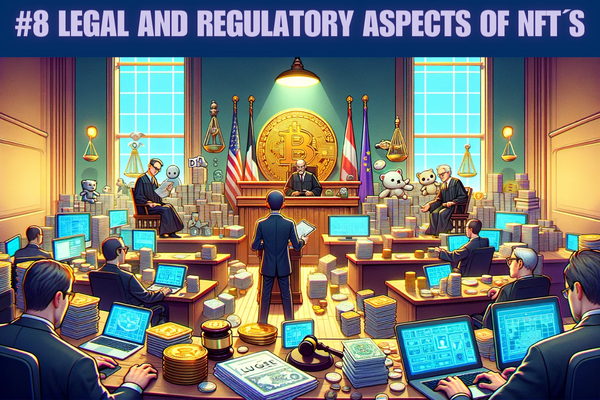
Article 8: Legal and Regulatory Aspects of NFTs
Welcome to our eighth exploration in the series, delving into the intricate legal and regulatory landscape surrounding Non-Fungible Tokens (NFTs), with a focused lens on Crypto Stamps. As these digital assets gain prominence, they usher in a myriad of legal considerations, encompassing copyright, intellectual property, authenticity, and the unique legal and ethical challenges in their trade. This article aims to provide a thorough understanding of these pivotal issues, equipping participants in the digital space with essential insights.
Legal and Regulatory Considerations for NFTs
The legal framework surrounding NFTs is complex and continuously evolving. The digital nature of NFTs, coupled with the global reach of blockchain technology, presents unique challenges in regulatory compliance and legal enforcement. Key areas of focus include:
- Regulatory Ambiguity: The rapid innovation in NFTs has outpaced the existing legal frameworks, leading to ambiguity in regulatory compliance, especially concerning securities laws, taxation, and consumer protection.
- Global Jurisdiction Issues: NFT transactions transcend national boundaries, raising questions about the applicable jurisdiction and the enforceability of legal claims across different legal systems.
- Smart Contract Legality: The self-executing nature of smart contracts raises questions about their status under contract law, particularly in scenarios of dispute resolution and contractual enforcement.
Intellectual Property, Copyright, and Authenticity
The intertwining of NFTs with intellectual property rights adds another layer of complexity, necessitating a clear understanding of the associated legal implications:
- Intellectual Property Ownership: Clarifying the ownership and scope of intellectual property rights associated with NFTs is crucial, particularly when multiple parties, such as artists, platforms, and collectors, are involved.
- Copyright Challenges: The digital replication of copyrighted material without proper authorization poses significant legal risks, emphasizing the need for stringent copyright adherence in the NFT ecosystem.
- Verification of Authenticity: Ensuring the authenticity of the digital asset linked to an NFT is paramount, with legal implications for both creators and collectors in maintaining the integrity of the asset.

Legal and Ethical Challenges in Trading Crypto Stamps
Trading in Crypto Stamps, a niche within the broader NFT market, encounters specific legal and ethical considerations:
- Consumer Protection Concerns: The opacity of NFT marketplaces can sometimes obscure the risks involved, leading to potential consumer protection issues, especially for uninformed participants.
- Ethical Trading Practices: Ensuring ethical practices in the trading of Crypto Stamps is vital, especially to prevent market manipulation, fraud, and other unethical behaviors that could undermine the market’s integrity.
- Legal Liability and Risks: Participants in the NFT market, including creators, sellers, and platforms, must navigate the legal risks associated with the creation, sale, and transfer of Crypto Stamps, ensuring compliance with relevant laws and regulations.
Conclusion: Legal and Regulatory Aspects of NFT´s
The intersection of NFTs, and specifically Crypto Stamps, with the legal and regulatory domains is intricate and multifaceted. Stakeholders must remain vigilant and informed about the evolving legal landscape, ensuring their activities align with current laws and ethical standards. As we advance, the legal ecosystem will undoubtedly adapt to the unique challenges posed by NFTs, shaping a more defined and robust framework for these digital assets.
Engaging with NFTs and Crypto Stamps not only requires a keen understanding of the technological and market dynamics but also a comprehensive grasp of the legal environment to navigate this innovative space effectively and responsibly.
Our forthcoming articles will continue to explore the diverse aspects of NFTs, shedding light on their impact across various sectors and their potential to redefine digital ownership and creativity in the blockchain era.





